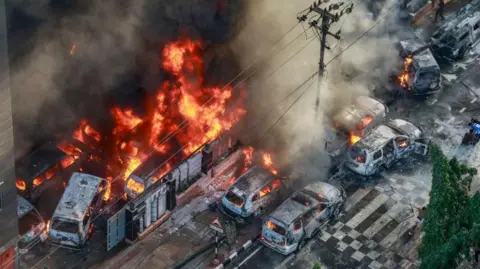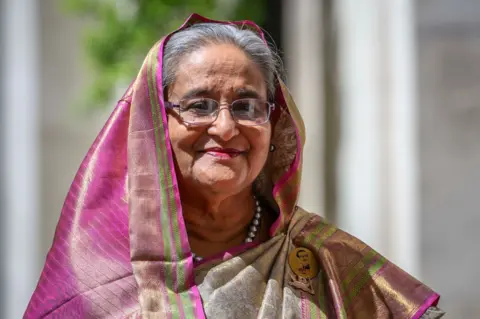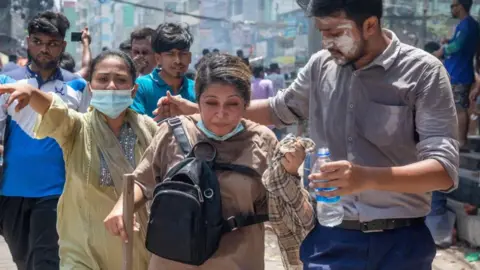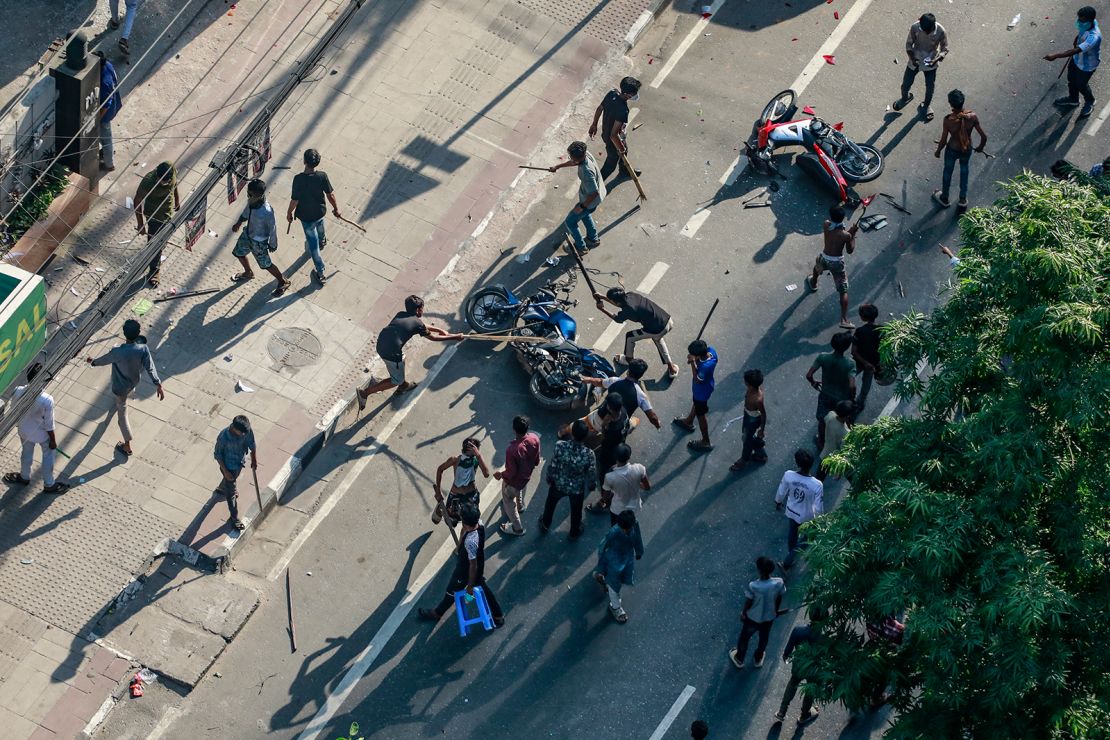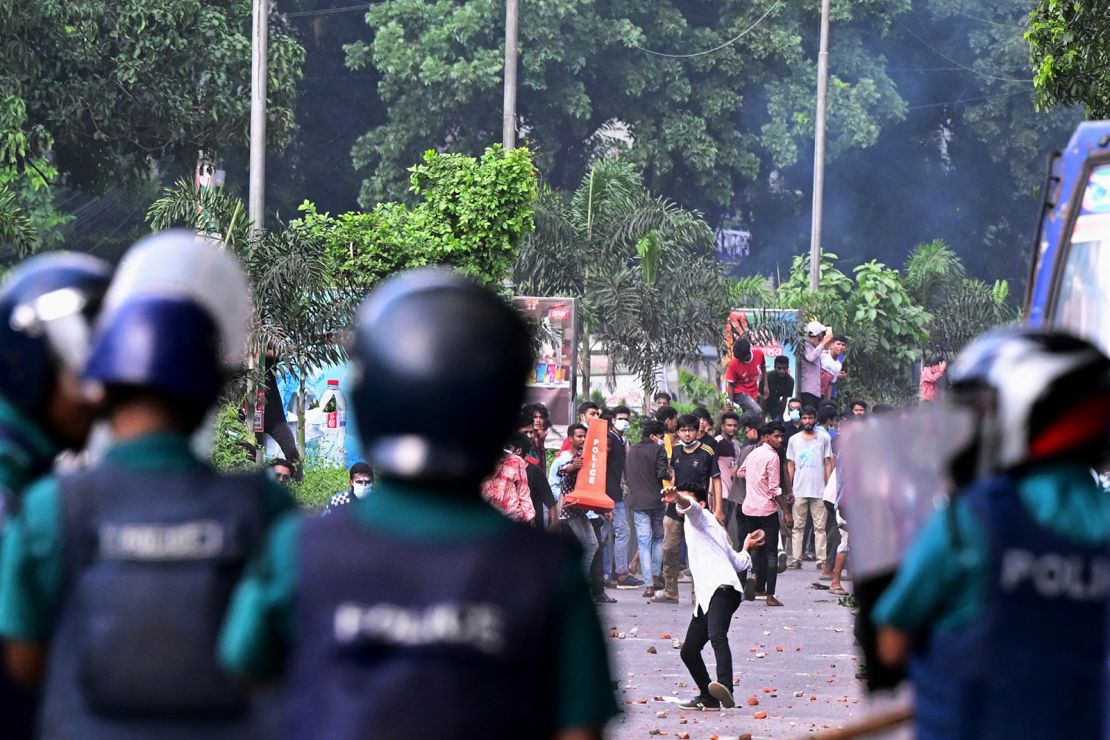Why is the Bangladeshi government facing so much anger?
By Anbarasan Ethirajan, South Asia Regional Editor
Getty Images
Bangladeshi students set fire to the country's state broadcaster on Thursday
Bangladesh is in turmoil.
Street protests are not new to this South Asian nation of 170 million people – but the intensity of the demonstrations of the past week has been described as the worst in living memory.
More than 100 people have died in the violence, with more than 50 people killed on Friday alone.
The government has imposed an unprecedented communications blackout, shutting down the internet and restricting phone services.
What started as peaceful protests on university campuses has now transformed into nationwide unrest.
Thousands of university students have been agitating for weeks against a quota system for government jobs.
A third of public sector jobs are reserved for the relatives of veterans from the country’s war for independence from Pakistan in 1971.
The students are arguing that the system is discriminatory, and are asking for recruitment based on merit.
Protest coordinators say police and the student wing of the governing Awami League – known as the Bangladesh Chhatra League – have been using brutal force against peaceful demonstrators, triggering widespread anger.
The government denies these allegations.
https://www.bbc.co.uk/news/articles/cl4ymjrx10xo
“It’s not students anymore, it seems that people from all walks of life have joined the protest movement,” Dr Samina Luthfa, assistant professor of sociology in the University of Dhaka, tells the BBC.
The protests have been a long time coming. Though Bangladesh is one of the fastest growing economies in the world, experts point out that growth has not translated into jobs for university graduates.
Estimates suggest that around 18 million young Bangladeshis are looking for jobs. University graduates face higher rates of unemployment than their less-educated peers.
Bangladesh has become a powerhouse of ready-to-wear clothing exports. The country exports around $40 billion worth of clothes to the global market.
The sector employs more than four million people, many of them women. But factory jobs are not sufficient for the aspiring younger generation.
Getty Images
Prime Minister Sheikh Hasina has been in power for 15 years
Under Prime Minister Sheikh Hasina’s 15-year rule, Bangladesh has transformed itself by building new roads, bridges, factories and even a metro rail in the capital Dhaka.
Its per-capita income has tripled in the last decade and the World Bank estimates that more than 25 million people have been lifted out of poverty in the last 20 years.
But many say that some of that growth is only helping those close to Ms Hasina’s Awami League.
Dr Luthfa says: “We are witnessing so much corruption. Especially among those close to the ruling party. Corruption has been continuing for a long time without being punished.”
Social media in Bangladesh in recent months has been dominated by discussions about corruption allegations against some of Ms Hasina’s former top officials – including a former army chief, ex-police chief, senior tax officers and state recruitment officials.
Ms Hasina last week said she was taking action against corruption, and that it was a long-standing problem.
During the same press conference in Dhaka, she said she had taken action against a household assistant – or peon - after he allegedly amassed $34 million.
"He can't move without a helicopter. How has he earned so much money? I took action immediately after knowing this,"
She did not identify the individual.
The reaction of the Bangladeshi media was that this much money could only have been accumulated through lobbying for government contracts, corruption, or bribery.
The anti-corruption commission in Bangladesh has launched an investigation into former police chief Benazir Ahmed – once seen as a close ally of Ms Hasina – for amassing millions of dollars, allegedly through illegal means. He denies the allegations.
This news didn’t escape ordinary people in the country, who are struggling with the escalating cost of living.
In addition to corruption allegations, many rights activists point out that space for democratic activity has shrunk over the past 15 years.
“For three consecutive elections, there has been no credible free and fair polling process,” Meenakshi Ganguly, South Asia director at Human Rights Watch, told the BBC.
“[Ms Hasina] has perhaps underestimated the level of dissatisfaction people had about being denied the most basic democratic right to choose their own leader,” Ms Ganguly said.
MONIRUL ALAM/EPA
An injured woman gets help on Thursday
The main opposition Bangladesh Nationalist Party (BNP) boycotted elections in 2014 and 2024 saying free and fair elections were not possible under Ms Hasina and that they wanted the polls to be held under a neutral caretaker administration.
Ms Hasina has always rejected this demand.
Rights groups also say more than 80 people, many of them government critics, have disappeared in the past 15 years, and that their families have no information on them.
The government is accused of stifling dissent and the media, amid wider concerns that Sheikh Hasina has grown increasingly autocratic over the years. But ministers deny the charges.
“The anger against the government and the ruling party have been accumulating for a long time,” says Dr Luthfa.
“People are showing their anger now. People resort to protest if they don’t have any recourse left.”
Ms Hasina’s ministers say the government has shown extreme restraint despite what they describe as provocative actions by protesters.
They say demonstrations have been infiltrated by their political opposition and by Islamist parties, who they say initiated the violence.
Law Minister Anisul Huq said the government was open to discussing the issues.
“The government has been reaching out to the student protesters. When there is a reasonable argument, we are willing to listen,” Mr Huq told the BBC earlier this week.
The student protests are probably the biggest challenge that has faced Ms Hasina since January 2009.
How they are resolved will depend on how she handles the unrest and, most importantly, how she addresses the public's growing anger.
Bangladesh
BBC





